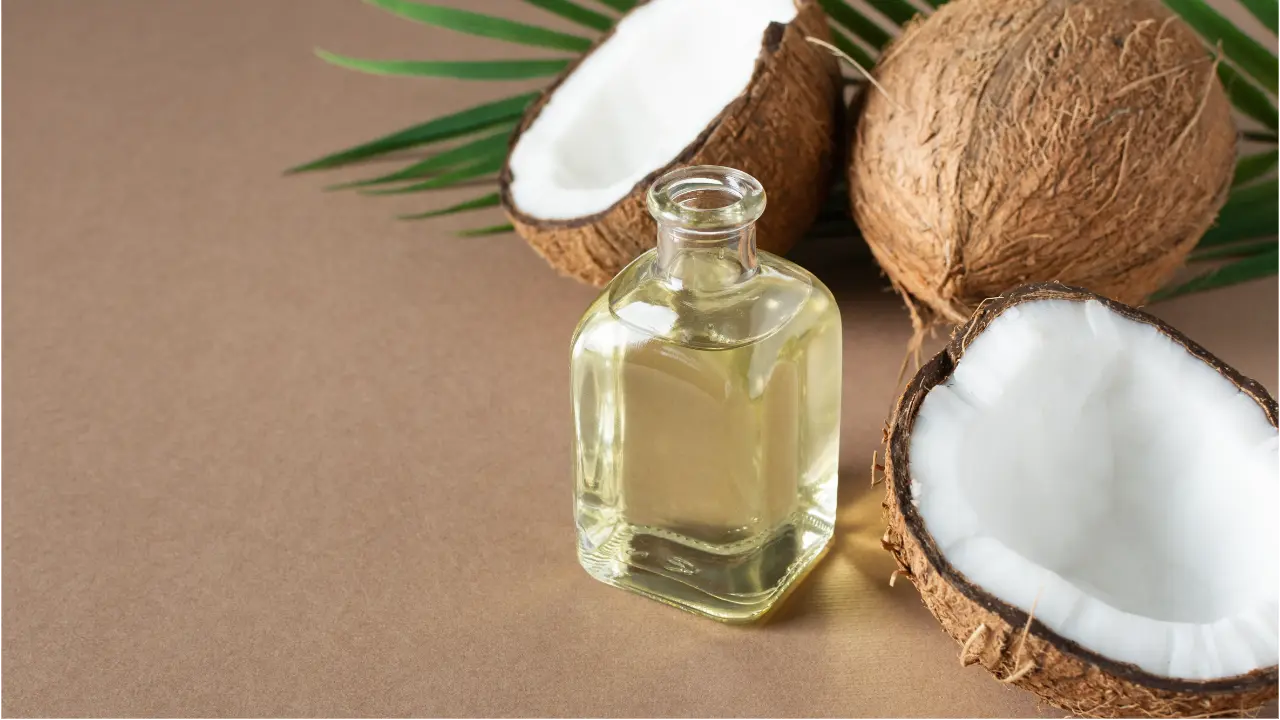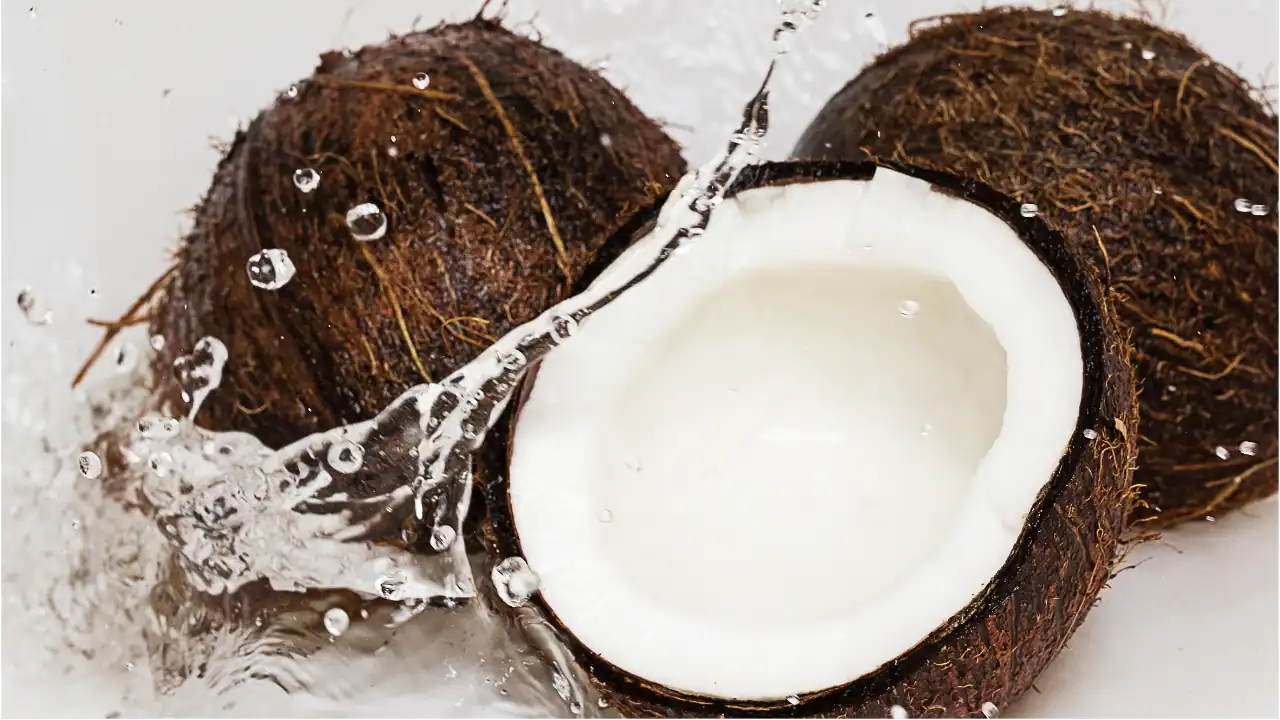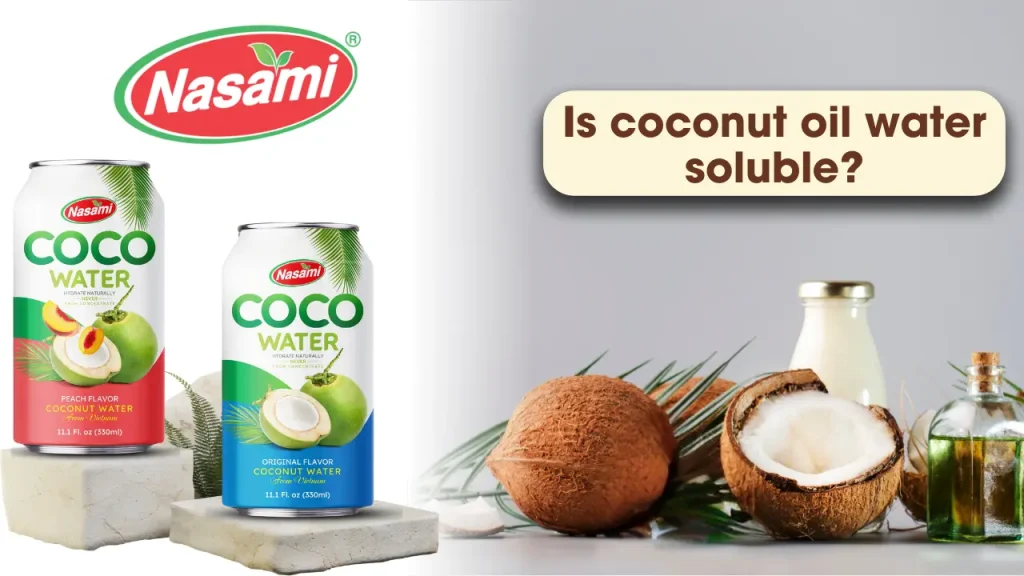Is coconut oil water soluble? Understanding Its Solubility and Applications. Coconut oil has become a staple in kitchens and bathrooms around the world, celebrated for its diverse applications from cooking to skincare.
Table of Content
ToggleHowever, one question often arises: Is coconut oil water soluble? Understanding the solubility of coconut oil is crucial for optimizing its use in various contexts. This article delves into the nature of coconut oil’s solubility, explaining why it doesn’t mix with water and exploring the implications of this characteristic for different applications.
What is Coconut Oil? Is coconut oil water soluble?
Coconut oil is a versatile and widely used oil extracted from the flesh of mature coconuts. This natural oil has gained significant popularity due to its myriad benefits and applications. To understand its properties, including its solubility, it’s important to first examine what coconut oil is and how it is commonly used.

Description and Composition of Coconut Oil
Coconut oil is a type of edible oil that is derived from the white flesh, or “copra,” of mature coconuts. It is known for its distinctive aroma and flavor, which can vary from mild to intense depending on whether it is refined or unrefined.
Composition:
- Fatty Acids: Coconut oil is primarily composed of saturated fats, making up about 90% of its fatty acid profile. The predominant fatty acids include lauric acid (around 50% of the total fat content), caprylic acid, and capric acid. These fats are responsible for its solid state at room temperature and its stability under heat.
- Medium-Chain Triglycerides (MCTs): A significant portion of the fatty acids in coconut oil are medium-chain triglycerides, which are metabolized differently from long-chain fatty acids. MCTs [1] are thought to provide quick energy and have various health benefits.
Overview of Its Common Uses
Coconut oil’s unique properties make it suitable for a variety of uses:
- Cooking: Due to its high smoke point and stable fat structure, coconut oil is a popular choice for frying and baking. It imparts a subtle coconut flavor to dishes and can be used in a wide range of recipes from savory to sweet.
- Skincare: In the realm of skincare, coconut oil is renowned for its moisturizing properties. It is used in numerous cosmetic products, including lotions, creams, and hair treatments, to hydrate and nourish the skin and hair.
- Health Benefits: Some people use coconut oil for its potential health benefits, such as improving digestion and supporting heart health. It is also popular in dietary supplements and natural remedies.
Understanding what coconut oil is and how it is composed helps clarify its interactions with other substances, including water. As we delve deeper into whether coconut oil is water soluble, this foundational knowledge will shed light on its behavior in various applications.
Get information about all products of Nasami Beverages.
Understanding Solubility
Definition of Solubility
Solubility is the property of a substance to dissolve in a solvent to form a homogeneous solution at a specific temperature and pressure. The extent to which a substance dissolves in a solvent is measured by its solubility, which can vary greatly among different substances. Solubility depends on the nature of the solvent, the solute, and environmental factors such as temperature and pressure.
Explanation of Water Solubility vs. Oil Solubility
Water solubility refers to the ability of a substance to dissolve in water. Water is a polar solvent, meaning it has a partial positive charge on one end and a partial negative charge on the other. This polarity allows water to dissolve other polar substances and ionic compounds, such as salts and sugars. Substances that are water-soluble typically have polar molecules or ionic bonds that can interact with water’s polarity.
Oil solubility, on the other hand, refers to the ability of a substance to dissolve in oil. Oils are non-polar solvents, meaning they do not have a significant charge separation within their molecules. This characteristic makes oils effective at dissolving other non-polar substances, which do not interact well with polar solvents like water. Substances that are oil-soluble usually have non-polar molecules, which can easily mix with oils.
Detailed Answer: Coconut Oil is Not Water Soluble
Coconut oil is not water soluble. This means that coconut oil does not dissolve in water and will remain as separate droplets when mixed with water.
Explanation of Why Coconut Oil Does Not Dissolve in Water
The reason coconut oil does not dissolve in water lies in the fundamental differences between their molecular structures. Water is a polar molecule, which means it has a partial positive charge on one side and a partial negative charge on the other. This polarity allows water molecules to form hydrogen bonds with each other, creating a cohesive network that can dissolve other polar substances and ionic compounds.
Coconut oil, however, is composed of non-polar molecules. Its primary constituents are fatty acids and triglycerides, which do not have a significant charge separation within their molecules. Because of this lack of polarity, coconut oil molecules do not interact with water molecules. Instead, they repel each other, causing the oil to separate from the water.
Molecular Structure of Coconut Oil
Coconut oil is predominantly made up of medium-chain fatty acids, such as lauric acid, capric acid, and caprylic acid. These fatty acids are composed of long chains of carbon and hydrogen atoms, which are non-polar. The molecular structure of these fatty acids lacks the polar regions necessary to form hydrogen bonds with water molecules.
The triglycerides in coconut oil consist of three fatty acid chains attached to a glycerol backbone. This structure further contributes to the non-polar nature of coconut oil, reinforcing its inability to dissolve in water.
Role of Hydrophobic and Hydrophilic Substances
The terms “hydrophobic” and “hydrophilic” are crucial in understanding why coconut oil is not water soluble.
- Hydrophobic Substances: These are “water-fearing” substances that do not mix well with water. Hydrophobic substances are typically non-polar, meaning they do not have charged regions that can interact with water molecules. Coconut oil is hydrophobic because its molecular structure is non-polar, causing it to repel water and remain separate when mixed.
- Hydrophilic Substances: These are “water-loving” substances that easily dissolve in water. Hydrophilic substances are usually polar or ionic, allowing them to form hydrogen bonds or electrostatic interactions with water molecules. Examples include salts, sugars, and alcohols.
Understanding the difference between hydrophobic and hydrophilic substances explains why coconut oil does not dissolve in water. The non-polar, hydrophobic nature of coconut oil contrasts sharply with the polar, hydrophilic nature of water, resulting in their mutual immiscibility.
Implications of Coconut Oil’s Solubility
How the Solubility Affects Cooking Techniques and Recipes
The insolubility of coconut oil in water significantly influences its use in cooking. Since coconut oil does not dissolve in water, it behaves differently compared to water-soluble ingredients. Here are a few implications:
- Mixing and Emulsifying: When cooking, especially in recipes that involve mixing or emulsifying (e.g., salad dressings or sauces), coconut oil will not blend with water-based ingredients. This means that to achieve a consistent texture, coconut oil needs to be combined with other fats or emulsifiers that can help integrate it into the mixture.
- Sautéing and Frying: Coconut oil is often used for sautéing and frying due to its high smoke point and stable composition. Its insolubility in water does not impact these cooking methods; rather, it can help prevent splattering since the oil remains separate from any water content in the food.
- Baking: In baking, coconut oil is a popular substitute for butter or other oils. Since it does not dissolve in water, it contributes to a different texture and mouthfeel compared to water-soluble ingredients. Coconut oil’s unique properties can enhance the richness and flavor of baked goods, but it’s important to ensure it is properly blended with other ingredients to achieve the desired consistency.
Benefits and Limitations Due to Its Solubility
The solubility of coconut oil has several implications for its use in skincare and beauty products:
- Moisturizing Properties: Coconut oil’s hydrophobic nature makes it an excellent moisturizer for the skin. It forms a barrier on the skin’s surface, helping to lock in moisture and prevent dehydration. Its oil-based composition allows it to penetrate the skin effectively, providing nourishment and hydration.
- Limitations in Formulation: In beauty products that require a water-based formulation (such as lotions or creams), coconut oil’s insolubility can present challenges. To incorporate coconut oil into these products, formulators often use emulsifiers to blend the oil with water-based ingredients, creating a stable and effective product.
- Cleansing: While coconut oil is effective in removing makeup and impurities due to its oil-based nature, its insolubility in water means that it must be followed by a water-based cleanser to remove any residual oil and ensure a clean finish.
Challenges and Solutions for Incorporating Coconut Oil
Incorporating coconut oil into cleaning products presents both challenges and opportunities:
- Challenges: Coconut oil’s hydrophobic nature makes it difficult to mix with water-based cleaning solutions. This can lead to separation issues and reduce the effectiveness of the cleaner. For cleaning purposes, the inability to dissolve in water means that coconut oil cannot directly contribute to cleaning tasks that rely on water solubility, such as dissolving grease or grime.
- Solutions: To overcome these challenges, coconut oil is often combined with other agents that can help blend it into water-based formulas. For example, surfactants and emulsifiers can help integrate coconut oil into cleaning products, creating effective solutions that leverage its beneficial properties. Additionally, coconut oil is sometimes used in combination with other oils or solvents that facilitate its dispersion and enhance cleaning performance.
By understanding the solubility of coconut oil and its implications in various applications, you can better utilize this versatile ingredient in cooking, skincare, and cleaning products, adapting your techniques and formulations to maximize its benefits.

Practical Tips
Tips for Using Coconut Oil in Recipes and Products
1. In Recipes:
- Substitute for Other Fats: When substituting coconut oil for butter or other oils in recipes, use a 1:1 ratio. Coconut oil can be used in both its solid and liquid states, depending on the recipe requirements.
- In Baking: Melt the coconut oil before mixing it into your batter or dough to ensure it integrates well with other ingredients. If the recipe calls for liquid fats, use melted coconut oil.
- Flavor Considerations: Coconut oil has a distinct flavor that may affect the taste of your dish. If you want to maintain a neutral flavor, opt for refined coconut oil, which has a milder taste compared to unrefined or virgin coconut oil.
2. In Skincare Products:
- Moisturizing: Apply coconut oil directly to the skin as a moisturizer. For a more blended approach, combine it with other hydrating ingredients to create a balanced formula that enhances its moisturizing benefits.
- Makeup Remover: Use coconut oil as a natural makeup remover. Apply it to your face and gently wipe off with a damp cloth or cotton pad.
- Hair Care: Use coconut oil as a conditioning treatment by applying it to your hair, leaving it on for a few hours or overnight, then washing it out with shampoo. It can help improve hair moisture and shine.
3. In Cleaning Products:
- Combine with Other Agents: Mix coconut oil with other cleaning agents to enhance its effectiveness. For instance, combine it with baking soda or vinegar to create a natural cleaning paste.
- Use in DIY Recipes: For homemade cleaning solutions, consider blending coconut oil with essential oils and other natural ingredients. This can create effective, non-toxic cleaning products.
Best Practices for Mixing Coconut Oil with Other Ingredients
1. Use Emulsifiers: To achieve a stable mixture when combining coconut oil with water-based ingredients, use emulsifiers such as lecithin, polysorbates, or xanthan gum. Emulsifiers help blend the oil with water, preventing separation and ensuring a consistent product.
2. Proper Mixing Techniques:
- Heat the Oil: When mixing coconut oil with other ingredients, particularly in recipes, warming the oil slightly can help it blend more easily. Be careful not to overheat it, as high temperatures can affect its properties.
- Blend Thoroughly: Use a blender or whisk to mix coconut oil with other ingredients. Thorough blending helps ensure that the oil is evenly distributed and incorporated into the mixture.
3. Consider the Formulation: In products requiring water solubility, such as lotions or creams, ensure that the formulation includes the right balance of water, oil, and emulsifiers. This balance will help achieve the desired texture and stability.
4. Adjust Consistency: For products that require a specific texture or consistency, adjust the amount of coconut oil and other ingredients accordingly. For example, in skincare formulations, increasing the oil content can create a richer, more moisturizing product.
Understanding the solubility of coconut oil helps in optimizing its use and ensuring that it performs effectively in different contexts. Whether you are cooking, crafting skincare products, or developing cleaning solutions, leveraging the characteristics of coconut oil with the appropriate techniques and additives can maximize its benefits and versatility.
Get information about all products of Nasami Beverages.

